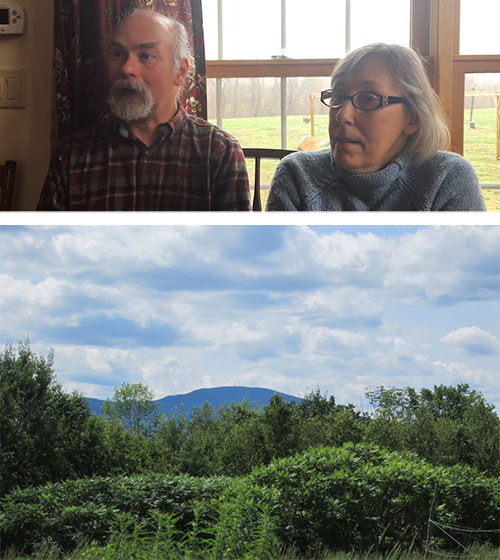Spotlight on Joe Schmidl and Cindy Owen, Five Rivers Easement Donors

The 139 acres on Loverin Hill Road in Salisbury has a long, rich farming history and a bright future, thanks to Joe Schmidl and Cindy Owen. From the 1760s into the early 1900s, this land was home to Fairview Farm. However, over the following fifty years, most of the fields returned to forest. In 2010, the land went up for sale and a developer came forward with a proposal to build thirty houses. When Joe and Cindy heard about the potential development, they decided they couldn’t let that happen and brought together the resources to buy the property.
Read more about Joe and Cindy below – their answers provide valuable insights into why conservation-minded property owners like them want to protect their land and what the conservation process involves.
Name: Cindy Owen and Joe Schmidl
Town of residence: Salisbury, NH
Please introduce yourselves and tell us where your land is located. Cindy is a certified professional midwife who works at the Concord Birth Center; Joe is a Professional Geologist and Certified Wetland Scientist who works for the New Hampshire Department of Environmental Services. Our land is located south of the end of Loverin Hill Road in Salisbury. We have a 144-acre parcel and have placed about 140 acres in a conservation easement with 5RCT. When we purchased it, the property included an old sugar shack, an 8-acre corn field, and the remainder had been heavily logged between 2007 and 2008. Since we purchased it at a foreclosure auction in 2010, we have built a home in a portion of the field and built a timber-framed barn on the property.
What makes this land special to you and why did you decide to conserve it? The property was proposed as a 33-lot subdivision in 2009. It is a poor location for such a subdivision, particularly because it is located off a dead-end road adjacent to the most-densely populated part of Salisbury, Hensmith Road. We felt it was important to maintain the 8-acre field as open space, partly for agricultural purposes and partly for wildlife habitat. We also wanted to encourage the reforestation of the recently logged portion of the property.
Why did you choose to work with Five Rivers? We met 5RCT at a event at the Concord Food Cooperative. They demonstrated that they shared our interest in conserving open space, and had a lot of experience working with folks like us. We’re glad we did; they recognize and appreciate our perspective in wanting to conserve the land and yet retain control over most everything that happens on the land. They were upfront about the few limitations that apply to the conserved area.
Please briefly describe the process of conserving your land with Five Rivers. Was the process easy or more difficult than you expected? The process was simpler than I expected. 5RCT volunteers worked with us to lay out the steps: having the property appraised, surveyed, and writing the conservation easement. 5RCT found grant money that paid for the survey, and filing fees at the Registry of Deeds. All we had to do was pay the $5,000 monitoring/stewardship fee (to which the grant could not be applied). In return, we received a $150,000 Federal Income Tax Deduction accounting for the difference in value of our property with and without the conservation easement. The tax deduction covered our income taxes for three years.
How often does Five Rivers come to your property and what do they do when they visit? We are visited once a year, and our monitor checks with us regarding changes (actual and proposed) and walks some portion of the property to verify current conditions. He’s a great guy, and shares 5RCT’s interest in conserving our land.
Has anything changed for you due to the conservation of your land? One thing we were concerned with was that our children might not share our interest in conserving our property when it passes to them, and might want to develop it. The conservation easement is permanent, guaranteeing that our gift to our community will be permanent. It is gratifying that many of our neighbors have taken the time to thank us for helping preserve the rural nature of Salisbury by conserving our land in perpetuity. We’ve been able to build a new, net-neutral home and outbuildings within the excepted area, and continue to develop maple sugar, native berries, lumber resources, and have converted the corn field into hayfield and pasture for a flock of sheep, making our dream of “homesteading” a reality. Joe joined 5RCT’s team of conservation monitors, and monitors a conservation easement in Boscawen annually. It’s been a great opportunity to get to know a group of conservation-minded people who share our values.
Is there anything you wish to convey to someone who is considering conserving their land? 5RCT has been a great partner in making Salisbury a bit better place to live. It is hard to express the satisfaction we share in having been able to make such a contribution to the quality of life of our town, despite our modest means. 5RCT has helped us act as philanthropists in a way we never dreamed we could.



